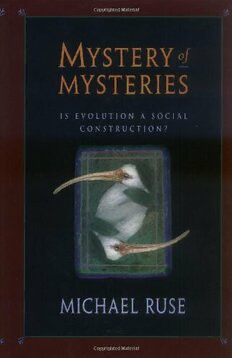
Mystery of Mysteries : Is Evolution a Social Construction PDF
319 Pages·1999·4.994 MB·English
Most books are stored in the elastic cloud where traffic is expensive. For this reason, we have a limit on daily download.
Preview Mystery of Mysteries : Is Evolution a Social Construction
Description:
The structure of the book consists of a series of dichotomies used to highlight the different ways science is approached and practiced, contrasting how cultural and epistemic values play a role in evolutionary science. Ruse starts with the contrasting philosophical frameworks of Thomas Kuhn (i.e., cultural) and Karl Popper (i.e. epistemic); they provide the ways in which the evolutionists of the book should be assessed. Erasmus Darwin's crude and speculative approach is contrasted to Charles Darwin's rigorous empirical one. Richard Dawkins' emphasis on the importance of the individual and natural selection is compared to Stephen Jay Gould's emphasis on the group's role with a corresponding de-emphasis on natural selection in favour of saltationism. Richard Lewontin's Marxist-inspired de-emphasis of adaptationism, arguing for the interacting roles of adaptation and environment, "one blending into the other" (p. 167), is contrasted with the prominence of adaptationism in the Southerner's Edward O. Wilson's progressive view of evolution. Finally, Geoffrey Parker's Darwinian adaptationism is compared to Jack Sepkoski's kinetic model of alternating rapid diversification and consolidation (once an ecological niche is filled); both employ a staunch empiricism and a Popperian "falsifiability criterion". As the book progresses, Ruse points out that there is a progression towards an ideal scientific methodology; it is one that becomes increasingly purged of cultural values and is better understood in the Popperian framework than the Kuhnian one.
Unfortunately, on a number of occasions Ruse forces a tenuous connection between scientific ideas and cultural background. As an example, he quotes Jack Sepkoski's disregard for his Christian educational background, "the Christian brothers had beaten religion out of me while trying to beat it into to me'" (p. 231), as evidence of his indifference to it in his work, but on the following page he notes that there is a very strong Herbert Spencer element of "states of dynamic equilibrium" (progress followed by a pause, followed by further progress) in his work, in spite of never having read of word of his: "... again we have reason to think that we have a culture-drenched vision, a neo-Spencerian one, rather than raw data" (p. 232), or "... or is Sepkoski (unconsciously) simply reflecting an American [Spencerian] tradition" (p. 233) . Why has Spenser left his mark on Sepkoski but not Christianity? Isn't there a progressive or teleological element in Christianity which could have left its "unconscious" mark on Sepkoski despite of his proclaimed "indifference"? If denying the role of one cultural influence, why not deny the role of both? On another occasion, Ruse mentions that Geoffrey Parker draws an analogy with painting in order to describe his approach to science, but Ruse then comments, "... this philosophy of science does not necessarily mean that Parker's values intrude into his science" (p. 211). Ruse tends to be selective about his examples and the lessons he draws from them.
This is a book that should be read with a very critical eye because Ruse occasionally oversimplifies and forces circular pegs into square holes in order to accommodate his theses. But it is also an approach with a pedantic purpose intended to show how one should assess what makes good science and accordingly how evolutionary science has progressed towards a high scientific standard. This approach does a good job highlighting similarities and differences - just remember it can be forced. In the end, Ruse argues that although Kuhn and Popper provide insight how science is practiced ("Both of our philosophers captured part of the overall picture" (p. 249)), it is the latter approach which should be the goal of science and is the "paradigm" of modern evolution. This book is packed with many interesting ideas from the post-Darwinian period, which is different from your typical history of evolution which focuses on the pre-Darwinian period. I rate this book 3.5 stars.
See more
The list of books you might like
Most books are stored in the elastic cloud where traffic is expensive. For this reason, we have a limit on daily download.
